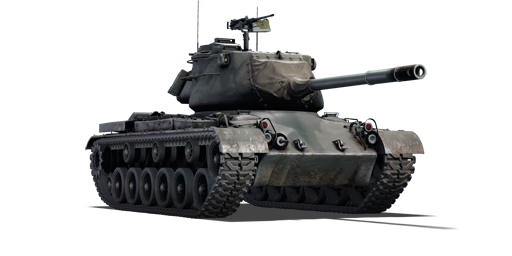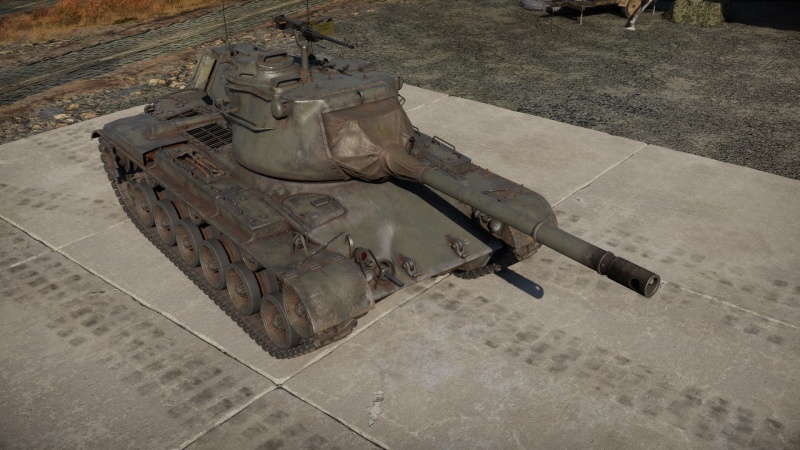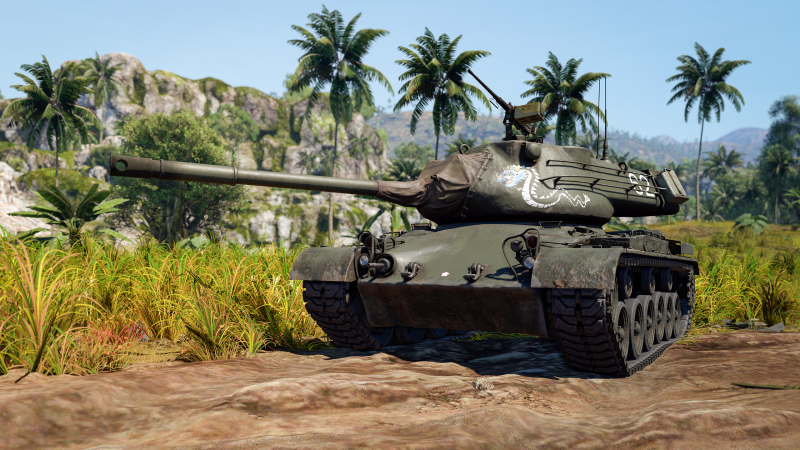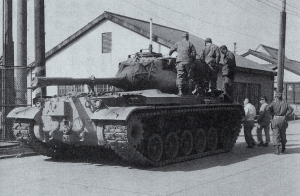M47 (Japan)
| This page is about the medium tank M47 (Japan). For other versions, see M47 (Family). |
Contents
Description
The 90 mm Gun Tank M47 Patton II was sent by the US to Japan for trials to evaluate its potential as the JGSDF was looking for a new medium tank design. But due to the Japanese order being backlogged because of the German order of M47s, the Japanese started development on their own tank beginning with ST-A series towards the Type 61 MBT. Somewhere halfway through the development, an American M47 could finally be acquired and was compared to the progress the Japanese already had, and it was decided that the Japanese maintained course in developing their own tank instead of ordering more of the M47.
The Japanese M47 was introduced in Update "Red Skies". Offering the exact same vehicle as the American counterpart, it gives Japanese tankers a glance at what more reliable armour can do, which at the battle range the M47 sits is pretty negatable due to APDS(FS) and HEAT(FS) being common sight here. The best course of action is to use this tank as any other Japanese medium tank, making good use of the powerful cannon while playing safe with the vehicle itself, treating it more like a glass cannon such as the previous Type 61 & ST-As before it.
General info
Survivability and armour
Armour type:
- Cast homogeneous armour (Front hull, turret, cupola)
- Rolled homogeneous armour (Hull sides, rear and roof, turret roof, cupola roof)
| Armour | Front (Slope angle) | Sides | Rear | Roof |
|---|---|---|---|---|
| Hull | 101.6 mm (59°) Upper glacis 75 mm (24-76°) MG port bulge 170 mm MG port housing 40 mm MG port 90 mm (52°) Lower glacis - Top 76.2 mm (27-54°) Lower glacis - Bottom |
85 mm Top - Front 38-50.8 mm Top - Rear 25.4 mm (67°) Bottom |
60 mm Upper plate - Centre 22.2 mm (60°) Lower glacis - Centre 38-50.8 mm Sides |
22.2 mm (0-16°) 25.4 mm (spherical) Front hatches |
| Turret | 121 mm (spherical) Turret front - Centre and Bottom 101.6 mm Turret front - Top 62-74 mm Gun mantlet |
63.5 mm (22-27°) 16 mm (spherical) Optics port |
76.2-90 mm | 25.4 mm |
| Cupola | 76.2 mm (cylindrical) | 76.2 mm (conical) Outer ring 25.4 mm Centre | ||
Notes:
- Suspension wheels are 20 mm thick and tracks are 30 mm thick.
- Belly armour is 25.4 mm thick.
- Storage boxes and mudguards are 5 mm thick.
- Turret bustle rack is 15 mm thick.
The M47 may not be able to survive direct hits from the 88, 100, and 122 mm calibre weapons often fielded by vehicles at Rank V. It is better to flank enemies to survive.
Mobility
| Game Mode | Max Speed (km/h) | Weight (tons) | Engine power (horsepower) | Power-to-weight ratio (hp/ton) | |||
|---|---|---|---|---|---|---|---|
| Forward | Reverse | Stock | Upgraded | Stock | Upgraded | ||
| Arcade | 54 | 22 | 46.2 | 1,255 | 1,545 | 27.16 | 33.44 |
| Realistic | 49 | 20 | 716 | 810 | 15.5 | 17.53 | |
Modifications and economy
Armaments
Main armament
| 90 mm M36 | Turret rotation speed (°/s) | Reloading rate (seconds) | |||||||||||
|---|---|---|---|---|---|---|---|---|---|---|---|---|---|
| Mode | Capacity | Vertical | Horizontal | Stabilizer | Stock | Upgraded | Full | Expert | Aced | Stock | Full | Expert | Aced |
| Arcade | 71 | -10°/+19° | ±180° | N/A | 34.3 | 47.4 | 57.6 | 63.6 | 67.8 | 9.75 | 8.63 | 7.95 | 7.50 |
| Realistic | 21.4 | 25.2 | 30.6 | 33.8 | 36.0 | ||||||||
Ammunition
| Penetration statistics | |||||||
|---|---|---|---|---|---|---|---|
| Ammunition | Type of warhead |
Penetration @ 0° Angle of Attack (mm) | |||||
| 10 m | 100 m | 500 m | 1,000 m | 1,500 m | 2,000 m | ||
| M318A1 shot | APBC | 193 | 190 | 177 | 162 | 148 | 136 |
| M82 shot | APCBC | 185 | 182 | 169 | 155 | 142 | 130 |
| M304 shot | APCR | 287 | 281 | 259 | 234 | 211 | 191 |
| M332 shot | APCR | 321 | 316 | 292 | 265 | 240 | 218 |
| M431 shell | HEATFS | 320 | 320 | 320 | 320 | 320 | 320 |
| M71A1 shell | HE | 17 | 17 | 16 | 16 | 16 | 16 |
| Shell details | ||||||||||||
|---|---|---|---|---|---|---|---|---|---|---|---|---|
| Ammunition | Type of warhead |
Velocity (m/s) |
Projectile mass (kg) |
Fuse delay (m) |
Fuse sensitivity (mm) |
Explosive mass (TNT equivalent) (g) |
Ricochet | |||||
| 0% | 50% | 100% | ||||||||||
| M318A1 shot | APBC | 912 | 10.98 | - | - | - | 47° | 60° | 65° | |||
| M82 shot | APCBC | 853 | 10.91 | 1.2 | 14 | 137.2 | 48° | 63° | 71° | |||
| M304 shot | APCR | 1,021 | 7.62 | - | - | - | 66° | 70° | 72° | |||
| M332 shot | APCR | 1,249 | 5.7 | - | - | - | 66° | 70° | 72° | |||
| M431 shell | HEATFS | 1,216 | 5.8 | 0.05 | 0.1 | 712.64 | 65° | 72° | 77° | |||
| M71A1 shell | HE | 732 | 10.55 | 0.2 | 0.1 | 1,210 | 79° | 80° | 81° | |||
| Smoke shell characteristics | ||||||
|---|---|---|---|---|---|---|
| Ammunition | Velocity (m/s) |
Projectile mass (kg) |
Screen radius (m) |
Screen deploy time (s) |
Screen hold time (s) |
Explosive mass (TNT equivalent) (g) |
| M313 | 821 | 10.7 | 9 | 5 | 20 | 50 |
Ammo racks
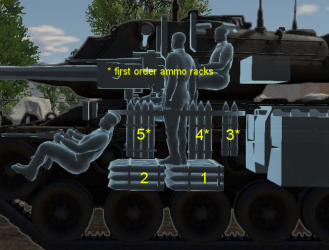
| Full ammo |
1st rack empty |
2nd rack empty |
3rd rack empty |
4th rack empty |
5th rack empty |
Visual discrepancy |
|---|---|---|---|---|---|---|
| 71 | 42 (+29) | 12 (+59) | 10 (+61) | 7 (+64) | 1 (+70) | No |
Notes:
- As they are modeled by sets of 2, shells disappear from the rack only after you fire both shells in the set.
- Shells are modeled by sets of 2 and disappear from the rack after both shells in the set having been shot or loaded.
- Racks 3 to 5 are first stage ammo racks. They total 11 shells and gets filled first when loading up the tank.
- These racks are also emptied early: the rack depletion order at full capacity is: 3 - 4 - 5 - 1 - 2.
- Simply not firing when the gun is loaded will move ammo from racks 1-6 into racks 8 then 7. Firing will interrupt the restocking of the ready racks.
Machine guns
| 12.7 mm M2HB | ||||
|---|---|---|---|---|
| Mount | Capacity (Belt) | Fire rate | Vertical | Horizontal |
| Coaxial | 1,800 (200) | 577 | N/A | N/A |
| Pintle | 600 (200) | 577 | -10°/+30° | ±180° |
The M47 (Japan) comes with 2 M2HB .50 cal machine guns (1 coaxial and 1 roof-mounted) that can provide a concentrated stream of heavy machine-gun fire against low-flying aircraft or lightly armoured vehicles.
Usage in battles
The M47 is often considered a "glass cannon". With a powerful gun but poor armour, it is recommended to play this vehicle carefully and conservatively. As such, it is often beneficial to use an ambush or flanking-based playstyle. Attacking enemies from soft or hard cover without being seen can maximize this tank's capabilities.
Tankers that have experience with the ST-A1, ST-A2 and to the same degree the Type 61 and ST-A3 will already be familiar with this vehicle's playstyle. The armour might be somewhat stronger than the previously mentioned vehicles but for the difference in BR and rank between them, it's about as effective against the tanks it will encounter at its BR.
The stock M318A1 APBC shell is relatively weak compared to shells used by other vehicles. While working towards the improved M431 HEATFS shell, it is advisable to shoot at enemies' tracks and gun barrels if the main hull is too armoured for the APBC shell to penetrate. Doing so will help to incapacitate your enemies and allow your better-armed teammates to destroy them. Additionally, the M47 shouldn't have trouble dealing with soft targets. With two .50 cal M2HB machine guns in addition to the 90 mm M36 main cannon, Light Tanks and Armoured Cars can be dispatched with ease. (On a side note, these machine guns can be used to spot enemy targets, alerting your team to their presence.)
Once the HEATFS shell is unlocked, the M47 can be played more like a classic medium tank. There will be few vehicles that the upgraded shell cannot penetrate. It is recommended to play near friendly vehicles in case support is needed. Even with an upgraded shell, the M47 is not a lone wolf and can suffer without the backup of its allies.
The M47 has above-average mobility, and achieving flanking positions should not pose too much difficulty. However, the tank does have a high profile, which can allow it to be spotted more easily. Combined with the vehicle's poor armour, this makes it especially important to stay out of the enemy's sight.
Pros and cons
Pros:
- Good mobility, same handling as the M46
- Great turret traverse speed once upgraded
- Decent frontal armour, thicker and more sloped than the ST-A3
- The main gun can penetrate up to 320 mm of armour with HEATFS ammunition
- Gun depression of -10° is usually sufficient to position behind short obstacles and hills
Cons:
- Overall poor armour for the rank, especially in the turret
- The gun is not very good with stock ammo APBC/APCR
- HEATFS is unable to be unlocked until the rank is reached and all previous ammunition choices are researched
- Mobility is limited until engine, filter and transmission modifications are researched
History
Japan started redeveloping its military in the form of the JSDF. Previously issued with surplus WWII-era American vehicles like M4A3 Shermans, M24 Chaffees, M15A1 CGMCs and other equipment, the JGSDF would want to gain a step up in tank development as the communist threat in Korea loomed close to the Japanese homeland. The JGSDF would attempt to get their hands on a new American medium tank that would become a staple of the Cold War, the M47 'Patton II'. Unfortunately for the Japanese, the American assembly lines for the tank were already backlogged with various other foreign orders, primarily from West Germany.
Due to the situation, the JGSDF started working on the prototype STA medium tank series which eventually culminated in the Type 61 MBT. During development, a single M47 'Patton II' was eventually sent to Japan for comparison to the domestic ST-A models. It isn't properly documented when this vehicle arrived in Japan but it has been speculated to have done so sometime in-between the completion of the ST-A1/2 (1957) and the development of the ST-A3/4 (1960). After Japan was done with prototyping and adopting the Type 61, the M47 lost its purpose in the JGSDF and was sent to be scrapped.
Remarkably, however, it was purchased by a private collector and the tank was saved before it could be destroyed. While they may not have been the original collector as said person or organization was never specified, the M47 ended up in the private collection of Nakata Shoten Shop. Located in one of their warehouses in the Tokyo Metropolis, the "Patton II" resides alongside several other vehicles used as evaluation and service vehicles in the JSDF: an M37 HMC, an M36 GMC, an M41A1, and an M59 APC.
While it's likely that the other vehicles were also deactivated due to Japanese civilian weapon control laws, the M47 in Tokyo is known to have been modified in ways that prevent it from being able to move or fire. Some of the changes include the breech being cut, the transmission and engine being removed, and multiple 10 centimetre-wide holes being drilled into the floor.
Media
- Skins
See also
- Related development
External links
| Japan medium tanks | |
|---|---|
| Type 97 | Chi-Ha · Chi-Ha Kai · Chi-Ha Kai TD · Chi-Ha Short Gun |
| Type 1 | Chi-He · Chi-He (5th Regiment) · Ho-I |
| Type 3 | Chi-Nu · Chi-Nu II |
| Type 4 | Chi-To · Chi-To Late |
| Type 5 | Chi-Ri II |
| Type 61 MBT | ST-A1* · ST-A2* · ST-A3* · Type 61 |
| Type 74 MBT | ST-B2* · Type 74 (C) · Type 74 (E) · Type 74 (F) · Type 74 (G) |
| Type 90 MBT | Type 90 · Type 90 (B) · Type 90 (B) "Fuji" |
| Type 10 MBT | TKX (P)* · TKX* · Type 10 |
| Other | Ka-Chi |
| USA | ▅M4A3 (76) W · ▅M47 |
| *Prototype | |


